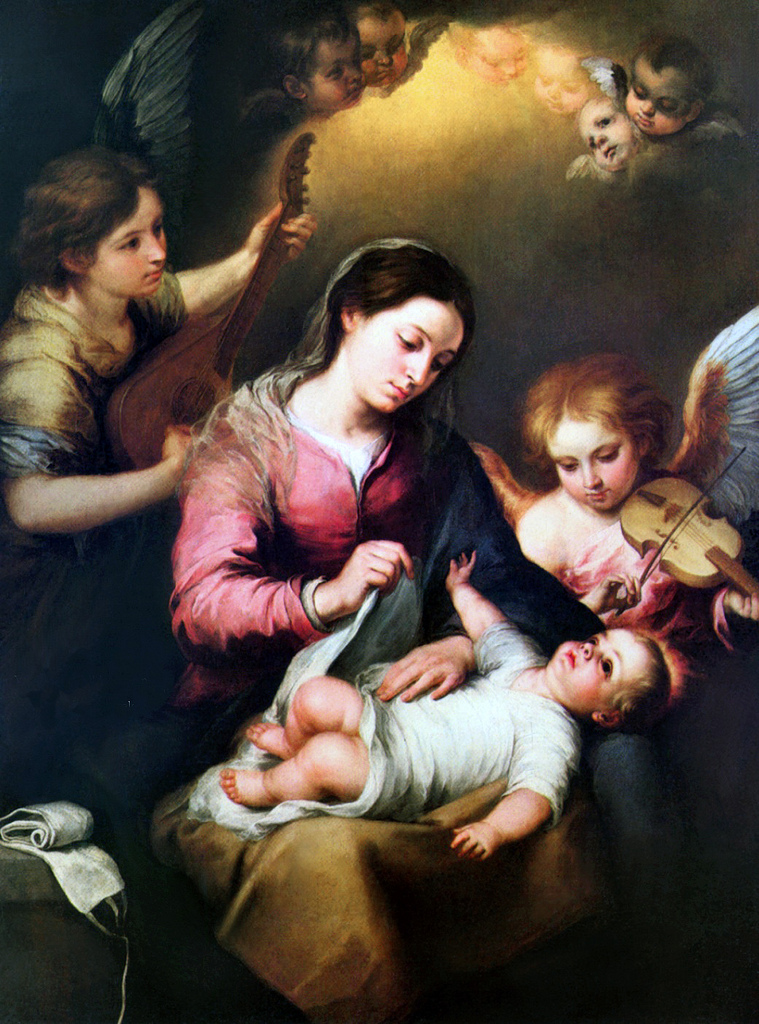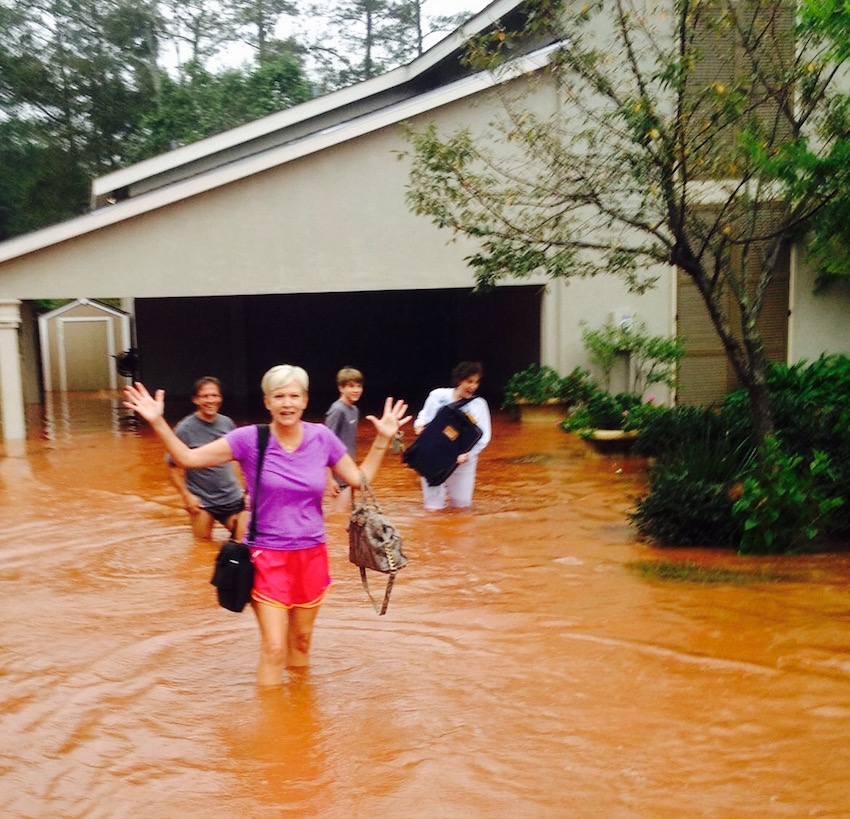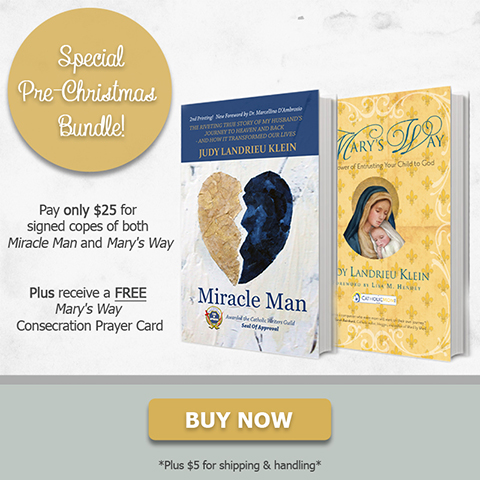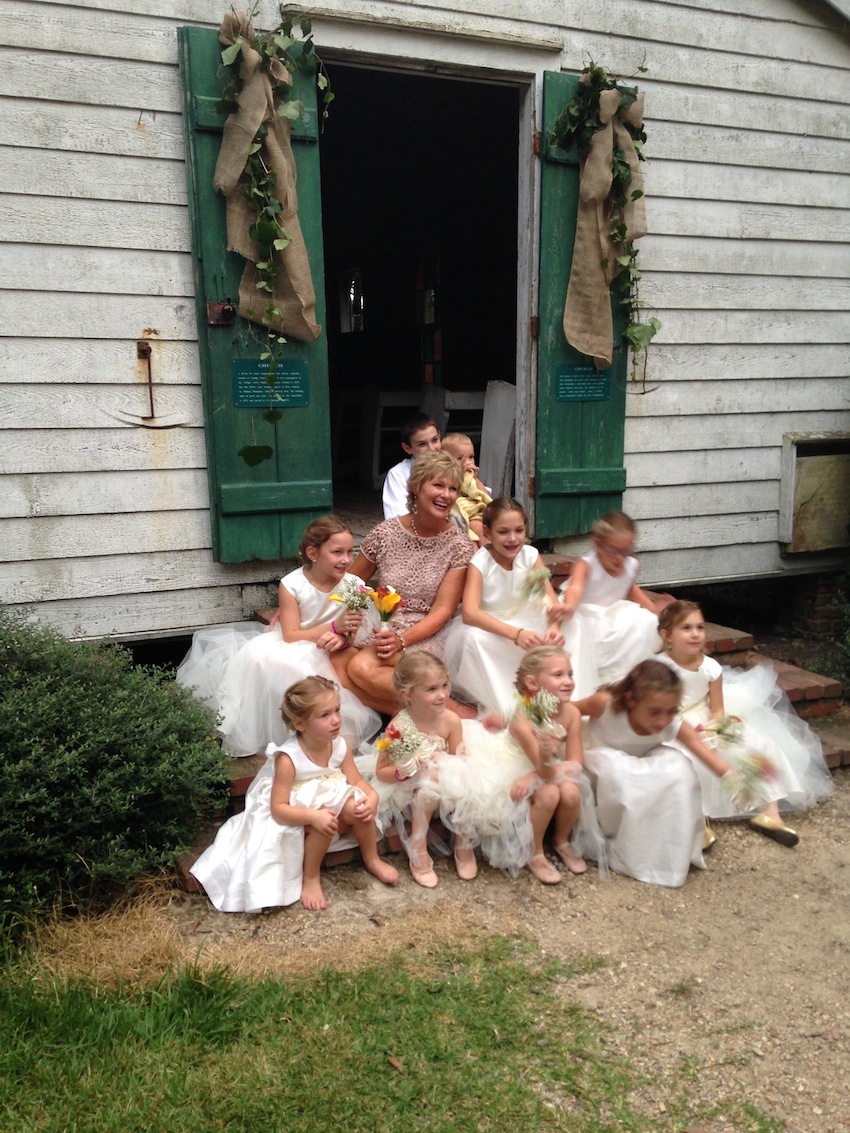Here we go again, you may be moaning as a painful situation rears its ugly head one. more. time. Perhaps you’ve prayed for a miracle for years, decades, even a lifetime. Maybe you’re exhausted from asking God to answer a prayer, or just flat angry at him for apparently not hearing you—especially if you’ve begged incessantly for something good, like a healing, conversion, or cure—something God would surely want, right?...
Read moreHealing Our Decembers
 Tears flowed freely during the meeting with my spiritual director, Sandy, as I shared with her the pain I was feeling. “December is here,” I said. “I get such a wave of anxiety and grief at this time of year.”
Tears flowed freely during the meeting with my spiritual director, Sandy, as I shared with her the pain I was feeling. “December is here,” I said. “I get such a wave of anxiety and grief at this time of year.”
Somehow, I have a hunch I’m not alone in experiencing December this way.
December is the month that “our lives blew apart with more violence than we ever dreamed possible,” I wrote in my book Miracle Man. The month that my late husband, Bernie, suffered a massive heart attack—leaving my children fatherless and me a widow after 87 excruciating days in the ICU. Eight years and a wonderful new marriage later, December still brings it all screeching back.
“Beg the Lord to heal the trauma of all your past Decembers,” Sandy wisely advised. “And ask him to fill you with the joy of his birth.”
For December is also the month when we celebrate our Savior’s presence penetrating Earth’s agonies, defying what human eyes behold as mere babe-flesh, disguising the God-man. This is the month that Hope is born, ushering in the time of fulfillment for the long-awaited healing of our crippled souls and lame lives. December is, indeed, the month of Advent hope.
The hope of Advent lies in experiencing the reality of human frailty—and in believing that Someone, though fragile in appearance, is coming to heal us soon. The hope of Advent consists in a hearty cry for deliverance from the weight of sin and death—and in trusting that God’s glory-weight will pierce right through all of this world’s darkness. For we have all known the sorrow of “Decembers” during life’s winter months, times of shadows and suffering where we cry out for the Light to come.
Every year I’m reminded that December is a fitting backdrop for Advent, as it is the month that throws off the least amount of light in the calendar year. The days grow short and winter begins. The darkness brings with it a certain sense of vulnerability and disorientation, along with the knowledge that we need more Light, so we can see.
Advent hope has everything to do with vision. Advent hope is inexorably connected with eternal perspective. That’s because hope—Christian hope—is so much more than plain old wishful thinking. It is the theological virtue by which we order our lives toward heaven; the virtue that establishes trust in us that there is a heaven, and gives us the conviction that we’ll live there with God some day. Hope reminds us that this earth is not paradise, strengthening and sustaining us as we travel toward the longed-for Promised Land. Hope gives us a new vision for our lives, enabling us to see that what may look like “disaster” to human senses is but a moment of time that God holds in his hands, shaping it for our good, while simultaneously, mysteriously, molding us into good.
“Can you see your Decembers as a time when God reaches into your life to work miracles, instead of as a time of sorrow?” Sandy gently asked. “You saw that once,” she continued. “You wrote a book about it.”
Yes, I saw it clearly then. But somehow I go blind every December.
And maybe that’s as it should be. Since it is December’s darkness that beckons me to encounter my desperate need for a Savior. Along with my need for a divine infusion of hope.
Thankfully, it is Advent. The season of so much blindness healed. The Church’s daily readings ring out promises of what the Messiah will bring, along with rich Gospel accounts of those promises being fulfilled:
On that day the deaf shall hear…and out of gloom and darkness, the eyes of the blind shall see. The lowly will ever find joy in the Lord, and the poor rejoice in the Holy One of Israel. Isaiah 29:18-19
And then we hear:
Two blind men followed him crying, “Son of David, have pity on us!” …Then he touched their eyes...And their eyes were opened. Matthew 9:29-31
Touch our eyes, Lord, and enable us to glimpse reality from heaven’s angle, through the lens of Advent hope. Heal all of our Decembers, and fill us anew with the joy of your birth.
Last week to order our Pre-Christmas Special: Get signed copies of both books, “Miracle Man” and “Mary’s Way,” for a bundle price of $25 right now at www.memorareministries.com. Free “Mary’s Way” Consecration Prayer Card included.
How Advent Helps US: Seeing Our Limitations as an Opening for God’s Greatness
 Those who see only limits feel lost in a senseless universe. They live a despondent life-style. Those who see limits as possibilities to go beyond live a hopeful life-style…True freedom is found in people who maintain what the philosopher Paul Ricoeur calls ‘the passion for the possible.’ Susan Muto, Blessings That Make Us Be, 4-5
Those who see only limits feel lost in a senseless universe. They live a despondent life-style. Those who see limits as possibilities to go beyond live a hopeful life-style…True freedom is found in people who maintain what the philosopher Paul Ricoeur calls ‘the passion for the possible.’ Susan Muto, Blessings That Make Us Be, 4-5
As December dawns and propels us toward the celebration of Christ’s birth, we are bidden to be an Advent people, to experience this sacred time with a “passion for the possible.” In short, we are reminded to live in hope.
In the darkest time of year, we light candles to remember the Light who has come into the world. On the shortest of days, we stretch forward in both anticipation and acknowledgement of God with us. As winter begins to dawn and flowers wither and die, we carry fresh, live trees into our homes to be lighted and ornamented with dazzling color, reminding us that we carry hope precisely by affirming what is alive and beautiful in our midst.
To be an Advent people is to make Christ’s coming truly present among us, not as some far-off distant memory, but as a calling forth into the present moment the presence of the One who is real. To be an Advent people is to choose not to ignore the pain and darkness in this world, but instead to embrace those realities with confidence and trust that Someone has come, is coming, and will come again to liberate us from the long night of sin.
Advent hope breaks right through the misery of sin to remind us of the mercy of God. It clears our vision of earthly concerns by inviting us to see light in the darkness. It blesses the human condition by remembering that a fully human God has redeemed our frail humanity. Advent is the hallowed time during which we gratefully acknowledge that our finite limits have already been met by eternal limitlessness.
Each and every day that we awaken, we are confronted anew with our limitations, be they tiredness from a sleepless night, fresh angst over troubled relationships, or the remembrance of failures and tribulations we must face again that day. But to arise resting assured that we are the fragile, fallible children of an all-powerful, infallible God makes us an Advent people: a people who see “limits as possibilities to go beyond,” who believe that the God-man has already gone beyond every human finitude.
For Bethlehem was indeed a place of finitude. Poverty, deprivation, cold and dark provided the “nursery” for the birth of the Savior—the hallowed space where the Transcendent One broke into, and through, those stark actualities with divine presence. There, in abject humility, God offered starlight to open blinded eyes, babe-flesh to woo hardened hearts, and the silence and solitude of the night to quiet the whole human race unto awakening. There, the waters of a virgin womb ushered in a new creation—bringing not just life, light, and hope, but the remedy for every human constraint, conquerable only through infinite power.
Advent “enables us to hope in (God’s) unpredictable generosity toward humanity,” (Muto, 5). Not just two thousand years ago, but today and every day.
Will we let Advent draw us in? Will we touch and feed upon the divinity that begs our remembrance of God’s unbounded potential to heal our human impotence? Will we awaken afresh to God’s presence, to light breaking through our darkness, and to the reality that every human weakness is an opening for a manifestation of God’s greatness?
Advent is meant to inspire in us a “passion for the possible,” which sees instead of “the darkness of sin, despair, inhumanity and persecution” the “how much more of God’s promise of redemption” (Muto, 5).
It is Advent. Anything is possible.
Author’s note: Thank you to Susan Muto, PhD, for her beautiful insights on the Beatitudes, which I have applied liberally to the theme of Advent.
This article was previously published at Aleteia.
Advent Special: Order "Miracle Man" and "Mary's Way" now to receive a signed copies of both books plus a free "Mary's Way" Consecration Prayer Card. Bundle price $25 at www.memorareministries.com. Order yours today.
Dear Self: How Holy Are You? How To Become Holy In One Not-So-Easy Step
IMG_3312
What does it mean to be holy? And how do we become holy?
These two questions burned in my mind for years as I moved from agnosticism, to fundamentalist Protestantism, then home to Catholicism. When I returned to the Catholic Church, I continued to ask the same questions about holiness as I specialized in apologetics, moral theology and bioethics. Finally, thanks to my life imploding, I came to the conclusion that holiness consists, quite simply, in love of and surrender to God.
Truth be told, I can now see that my trajectory within Christianity was an attempt, albeit a worthy one, to have an authority tell me the truth in black and white, give me the laws, and present me with the parameters in which to live. I used to joke that I just wanted someone to tell me the flipping rules so I could follow them!
Because deep down I knew that following the rules was a heck of a lot easier than surrendering to a wild, unpredictable God—especially a God who allows so much suffering in life. It took many years of prayer, study, soul-searching and, of course, personal suffering before I began to see that the essence of holiness is not formulas, facts or feats—good as those can be—but trusting God. And that the indispensable ingredients of holiness are hoping in God in all things, believing he is good no matter what, and surrendering to his love with abandon.
Sounds simple enough, right? Simple maybe. But easy, no.
Thanks to a suggestion by Amazon, I recently happened upon Dr. Peter Kreeft’s new book, How To Be Holy: First Steps In Becoming A Saint, which explains masterfully why holiness is simple but hard. Amazingly, at least to me, Kreeft affirms exactly what I’ve been trying to say in both my writing and talks—that holiness it isn’t about performance, but surrender. In other words, holiness has much less to do with asserting my will as it does with assenting to God’s. And therein lies the crux of Kreeft’s message.
With the brilliance, wit and logic that is classic Kreeft, the prolific author and philosopher sums it up neatly in these words:
“‘Abandonment’, or ‘islam,’ or ‘surrender',’ to God’s providential will is also the very essence of holiness.” Kreeft, How To Be Holy, 31
He builds his thesis on the truth that God is all-good, all-knowing and all-powerful, and upon St. Paul’s words in Romans 8:28 which say: “We know that all things work together for good for those who love God, who are called according to his purpose.”
Most of us would readily agree that God is good and working all things together for our good when things are carrying on happily in our lives; that is, when they are going according to “our will.” During these times, we are invited to cultivate the virtues of faith, hope and love by aligning our will with God’s and growing in relationship with him.
But it is when God allows us to be sanctified, or made holy, “against our will, through suffering” (Kreeft, 32), that we are frontally challenged to exercise the theological virtues in a more radical way. It is then that we must decide whether we really believe that God is good and whether we truly trust that what he is permitting in our lives is for our good. In these moments of permitted purification, we are beckoned to abandon ourselves with confidence to God’s providential will, allowing the fire of God’s love to burn away the dross of our own self-love and self-will—in a word, selfishness—which, Kreeft says is the main obstacle to holiness. When we assent to God in the midst of suffering, we begin to experience what the sage author calls “joyful, trusting self-surrender,” which requires saying: Not my will, but thy will be done.
And that, my friends, that hard prayer of willing, intentional surrender in abandonment to a God we believe is good and loving—in the teeth of what is often a hard-fought battle through suffering—is what makes us holy.
Simple perhaps. Easy no. But entirely possible with grace.
This article previously appeared at Aleteia.
Please visit my website to see the exciting updates and to grab some shareable graphics with quotes from "Mary's Way."
Is God Good All The Time? Or Only When We Feel Blessed?

Forty thousand Louisiana families lost their homes this week to what is being called the “Great Flood,” and more homes are about to go under as I write. Meanwhile, I’m reading posts on Facebook that are saying things like: “God is so good! He spared our home. We are so blessed.” And I’m asking very seriously: Really?
So if your home had flooded, would God be less good? And where does that leave the forty thousand now-homeless families in our state? Are they cursed instead of blessed? Or maybe just less blessed than those whose homes were spared?
One of my pet peeves in life is how often we Christians equate “the blessing” with our own physical and material prosperity, and God’s goodness with how well our lives are going on any given day. Without being cognizant of it, we have somehow bought lock, stock and barrel into the “prosperity gospel,” which purports to guarantee blessing in the lives of those who are favored by God—those who pray hard enough, have potent enough “prayer warriors” in their camps, and do this thing called Christianity just right.
This convoluted approach to the Christian faith has seeped deep into our collective Christian psyches, and it seems to reverberate everywhere we turn. It’s also a message that I personally experienced as a despair-provoking battering ram in the midst of multiple life calamities; during the long, painful years I spent with clenched fists asking God: “What does it take to get the flippin’ blessing?”
After many years and much suffering, I finally came to the conclusion that I was asking the wrong question completely. It was then that I began to ask instead: Lord, what IS the blessing?
So what does Jesus actually have to say about “the blessing”? There’s only one place in the Gospels that Jesus repeatedly invokes the word “blessed,” and that is in the Beatitudes. In Luke 6, Jesus uses the word “blessed” four times in a row (nine times in a row in Matthew’s account in Chapter 5). In every case in Luke’s Gospel, the word is followed by an adjective that describes people that most of us would consider anything but blessed: the poor, the hungry, the weeping, the hated, the excluded, and the insulted—those we would probably quickly deem “cursed” today.
I’ve pondered much about Mary—the most blessed woman that ever lived—and how her life would be judged were she alive right now. She was apparently widowed; and then lost her only son to a brutal, violent death upon a cross between two notorious criminals. And that was only after her beloved son was publicly accused of being a blasphemer, a lunatic, and possessed. In spite of this, we find the word “blessed” used repeatedly in regard to Mary; starting when Elizabeth proclaims to her in a loud voice: “Most blessed are you among women, and blessed is the fruit of your womb…blessed are you who believed that what was spoken to you by the Lord would be fulfilled” (Luke 1:42-45). We hear those words again in reference to Mary when “a woman from the crowd” cries out to Jesus saying, “Blessed is the womb that carried you and the breasts at which you nursed” (Luke 11:27-28). Jesus’ response—“Rather, blessed are those who hear the word of God and observe it”—is an implicit reference to his mother’s unwavering faith in God that echoes the words spoken by Elizabeth.
Mary’s life gives us a glimpse of what the blessing looks like, and it is not based on the fact that her life went “well”—at least as the world defines “well.” Instead, her beatitude was found in her steadfast trust in God no matter what trials life brought, in her continuous “yes” to him in the face of great adversity, and in her constant cooperation with his salvific plan, no matter how much it suffering it involved.
This is the blessed state of being to which we are all invited to participate as Christians—a way that defies this world’s way of thinking. It is a way of living in peace and hope that comes only through faith, trust and surrendered abandonment to a God we believe is always good, no matter what happens.
This article was previously published at Aleteia.
Hope For Troubled Parents: Become A Child Yourself
 Twice recently I've heard parents say: “I did everything right, and my child is still doing (name your favorite sin).” “Good luck with that!” I responded to one of them in a voice that was louder and more vigorous than I intended. Because the lie that if you do it all right, then you’ll be guaranteed a good result is a form of an ancient heresy known as Pelagianism. The old heresy now has a new moniker: the Prosperity Gospel, which purports that if I do X and Y then I will earn Z from God. Oh, how it misses the point of God’s grace!
Twice recently I've heard parents say: “I did everything right, and my child is still doing (name your favorite sin).” “Good luck with that!” I responded to one of them in a voice that was louder and more vigorous than I intended. Because the lie that if you do it all right, then you’ll be guaranteed a good result is a form of an ancient heresy known as Pelagianism. The old heresy now has a new moniker: the Prosperity Gospel, which purports that if I do X and Y then I will earn Z from God. Oh, how it misses the point of God’s grace!
What a relief to heartily admit what two of the greatest saints of our era, namely St. Faustina and St. Therese of Lisieux, freely admitted: they couldn’t get it right. While simultaneously reading St. Faustina’s Diary and Fr. Michael Gaitley’s 33 Days to Merciful Love, I was almost giddy when I happened upon Faustina and Therese’s own words:
O my God, I understand well that you demand this spiritual childhood of me…I am an abyss of misery, and hence I understand that whatever good there is in my soul consists solely of His holy grace. The knowledge of my misery allows me, at the same time, to know the immensity of Your mercy. (St. Faustina, Diary, par. 56.)
And if the good God wants you weak and helpless like a child…do you believe you will have less merit?...Agree to stumble at every step, therefore, even to fall, to carry your cross weakly, to love your helplessness. (Gaitley, quoting Therese, 56)
Before I read those words, I’d been feeling particularly low about the mistakes, failures and foibles I’ve made as a parent. But surprisingly, every time I turned to the Lord for guidance he said the same thing to me: Become a child yourself.

Why?
Children are spontaneously, intuitively in touch with their own neediness, and they are quick to ask for help. Children have open hands and open hearts, and they stand ready to receive love with gratitude and joy. Children live in expectant faith that if they fall, fail or flail their Papa is going to take care of it—and he’s going to take care of them, too. Children trust completely.
This is the way of spiritual childhood that Faustina and Therese found so liberating; it is the way of the child through which we, too, must pass in order to enter the kingdom of heaven. The way of spiritual childhood is the path of humility and trust: I freely and humbly admit that I’m a hot mess, while furiously trusting that I am loved and redeemed by a merciful God who is bigger than all of my sins and weaknesses.
Of course, I try my best to live and love according to the ways of Christ. And when I fail to do so I turn to God, trusting that he will fill in the gap of all I am lacking in love and holiness with his love and holiness, and that his offering is superabundantly sufficient. Joseph Ratzinger (Pope Emeritus Benedict XVI) said it this way:
What faith basically means is just that this shortfall that we have in our love is made up by the surplus of Jesus Christ’s love, acting on our behalf. He simply tells us that God himself has poured out among us a superabundance of love and has thus made good in advance all our deficiency. Ultimately, faith means nothing other than admitting that we have this kind of shortfall; it means opening our hand and accepting a gift. (Ratzinger, What It Means to Be A Christian, 74).
Are you fretting about all you lack as a parent? Then become a little child. Abandon yourself and your children completely to God, trusting that his love will make up for whatever is lacking in yours. This is grace. For as the Little Flower herself insisted, all is grace.

This article was previously published at Aleteia.
The Day I Kissed The Pope
We rose at the crack of dawn on a beautiful Rome morning to don our wedding attire and arrive early at St. Peter’s Square, just as we were instructed. To our surprise and delight, my husband, Mark, and I had been granted permission to have our marriage blessed by Pope Francis on the second attempt—after our first request for the “sposi novelli” blessing was turned down because we’d been “married too long.”
As the Vatican normally requires newlyweds to appear for the papal blessing within the first two months of marriage, an exception was made after we explained that Hurricane Isaac had swamped the interior of our Louisiana home with six inches of water, prompting the gutting of the house along with a yearlong delay in our honeymoon. That was only part of the crazy story of the miracle of our marriage, and the crazy miracle of having it blessed by the pope.
Never married before, Mark had lived abroad as a Catholic missionary for 27 years, with 23 of those spent headquartered in a community in Rome. After 25 years of marriage I’d been widowed for two years and, frankly, expected to remain single for the rest of my life. All of that changed when our paths converged in my parish adoration chapel, to which providence had led Mark upon his recent return to America. We married a year and a half later, then traveled to Rome in 2013 for our first anniversary to tour Mark’s former stomping-grounds and see the newly elected pope--the man who would soon become, according to Gallup polls, “the most popular leader in the world.” Needless to say, we were elated.
Mark and I had no idea what to expect that day, as the “sposi novelli” blessing is somewhat shrouded in mystery, lending to the intrigue and excitement of the event. Virtually no information is given to participants about what will take place, other than the instructions to arrive at 7:00 a.m. to gain entrance to a special section of seating for the noon Wednesday audience. That, plus the advice to bring snacks and water for a long day of waiting.
We sat for five hours in front of St. Peter’s Basilica in what, by noontime, was piping hot sun. Trying our best to stay fresh (and not drip sweat on our wedding attire), we sipped water and dabbed Kleenex on our damp faces as we gleefully shared wedding stories with the other newlyweds around us.
At long last, Pope Francis appeared in the popemobile and rode through the large crowd assembled in St. Peter’s Square before taking his place on the stage directly in front of us. After delivering an address in Italian about the Church being our Mother, which Mark kindly translated into my ear, the pope gave a general blessing to the thousands of attendees before making his way through the crowd, shaking hands with hundreds of the faithful over the next hour. It was now 1:30 p.m. and we still weren’t sure if we were going to meet the pope.When Vatican guards finally told us to line up in order, our hearts soared. Pope Francis came to the newlywed section and began greeting each of the hundred or so newly married couples in attendance, personally handing each person a blessed Rosary as a gift.
When our turn came, the pope extended his hand to shake mine as we walked up, and quite spontaneously, I leaned in and kissed him on the cheek. A wave of panic came over me as I immediately thought: I don’t think I was supposed to do that! But the pope was quite at ease, smiling warmly as he held my hands and looked me directly in the eyes. He then turned to Mark to carry on a ten-minute conversation with him in his native Spanish. (The pope does not speak English and it was quite a stretch for him to deliver so many addresses in English during his visit to America.)
Mark and I were amazed that Pope Francis was completely present to us the entire time we spoke, as though we were the only other people with him on the planet, as though he had nothing else in the world to do but stand in the hot sun in one of the busiest public squares on earth and ask about our lives.
“He is a pope who has introduced us to a new style. He has abandoned the rituals, the courtly formalities … and so, somehow, he is very striking. No? Some boys and girls say: ‘He seems like one of our relatives.’ What do they mean by this? That there is a closeness, a proximity. I feel welcomed exactly as one of my family welcomes me,” Msgr. Dario Edoardo Viganò, Prefect of the Holy See’s Secretariat for Communications, said in an interview about his new book about Pope Francis entitled “Fidelity Is Change.”
I can tell you first hand that this is true. I kissed the pope, and it felt like I had kissed a beloved father. Moreover, the successor of St. Peter gazed into my eyes—looked into me, looked through me, looked at me with the penetrating eyes of Jesus Christ. I felt seen as I’ve rarely felt seen by another human being in my entire life, and I will never forget the experience. Surely it was that same look that drew people to Jesus.
“Please pray for me,” the pope said sincerely as he closed our conversation in broken English.
And I have, without fail, every day since. Just like I pray for my own father.
Note: This article was previously published on Aleteia.
Held
Overcome with emotion as I watched my dear friend, Melanie, walk through the front door of the tiny chapel last Friday evening, the tears were flowing freely. Tears of happiness that my fellow widow was getting married again, mixed with tears of remembrance of all of the times we had wept together after our husbands died.
Those were some raw, painful days. But this was a new day. We were celebrating a resurrection.
Mel glowed radiantly as she walked up the aisle of the rustic 18th Century Baton Rouge church, where her fiancé, Bob, and her two sons—both Protestant pastors—waited in front to celebrate nuptial vows. The moment could not have been more beautiful, with eight little ivory clad granddaughters preceding the bride, and a harpist throwing ethereal sounds through open windows that welcomed the encroaching dusk. Quite the contrast to the many evenings Mel and I had spent at my home sharing stories of shattered dreams and weeping together, even as we reminded each other that we were still safe in the embrace of God, maybe being held closer than ever before.
Her story included the agonizing disappointment of failed marriage, followed by the all too brief elation of meeting and marrying a best friend, a devout Christian man with whom she was happily prepared to spend the rest of her life. They'd been married just twenty eight months when Don was struck dead late one September afternoon, hit head-on by a crystal meth-crazed driver as he toured a country road on the motorcycle he loved. The wreckage was immense on every level. I met Mel shortly thereafter, and I watched her scrape herself out of bed day after day to tend to the needs of her eleven-year-old son and meet with clients in her counseling practice. I marveled that she was able to get out of bed at all, to put one foot in front of the other and continue to walk forward—and that she trusted that God had not abandoned her. Natalie Grant’s song “Held” became her anthem, and she played it all day long to remember that God was holding her, even in the midst of her pain and darkness:
This is what it means to be held, how it feels, when the sacred is torn from your life
And you survive. This is what it is to be loved, and to know that the promise was that when everything fell, we'd be held.
We huddled together and held on, and we were held. And now, on another September day, a new holding was taking place. I pondered the mystery of life’s seasons as we beheld this resurrection:
Do you take this woman… to have and to hold, from this day forward…until death do you part?
Melanie was getting married, and God and Bob would hold her now.
God-incidentally, Mel’s wedding happened to be the same weekend that I was celebrating the second anniversary of marriage to my precious husband, Mark. Mark and I met two years after my late husband, Bernie, died of a massive heart attack. Having just returned from working abroad for twenty-seven years as a Catholic missionary, Mark was spending several hours a day praying in the Adoration Chapel, discerning what God had in store for him next. It was there that we met.
We struck up a friendship, centered on our faith in God and on our mutual love of Catholic theology. Walks on the lakefront discussing theology and philosophy turned into discussions about our life journeys. The reality of jarring and unexpected changes, the death of lifelong dreams and the prospect of futures uncertain all became fodder for conversation. Mark and I became closest friends over the months, and a year after we met we were engaged.
On September 29, 2012, the Feast of the Archangels, we pronounced our wedding vows at Sacred Heart Catholic Church amidst the pouring rain. Many nights since then Mark has held me close, catching tears of gratitude for my new life with him, as well as tears of still fresh grief from life’s unanticipated wounds.
All of that came rushing in as I watched a dear friend with whom I’ve shared so much walk up the aisle, her feet and face light with happiness. It would have been enough for us to be held by God, and that’s all we were hoping for, really. But to be held again in the arms of marital love was an unexpected rebirth for both of us. I give heartfelt thanks to God for the gift of new embrace, for Melanie and for me.







